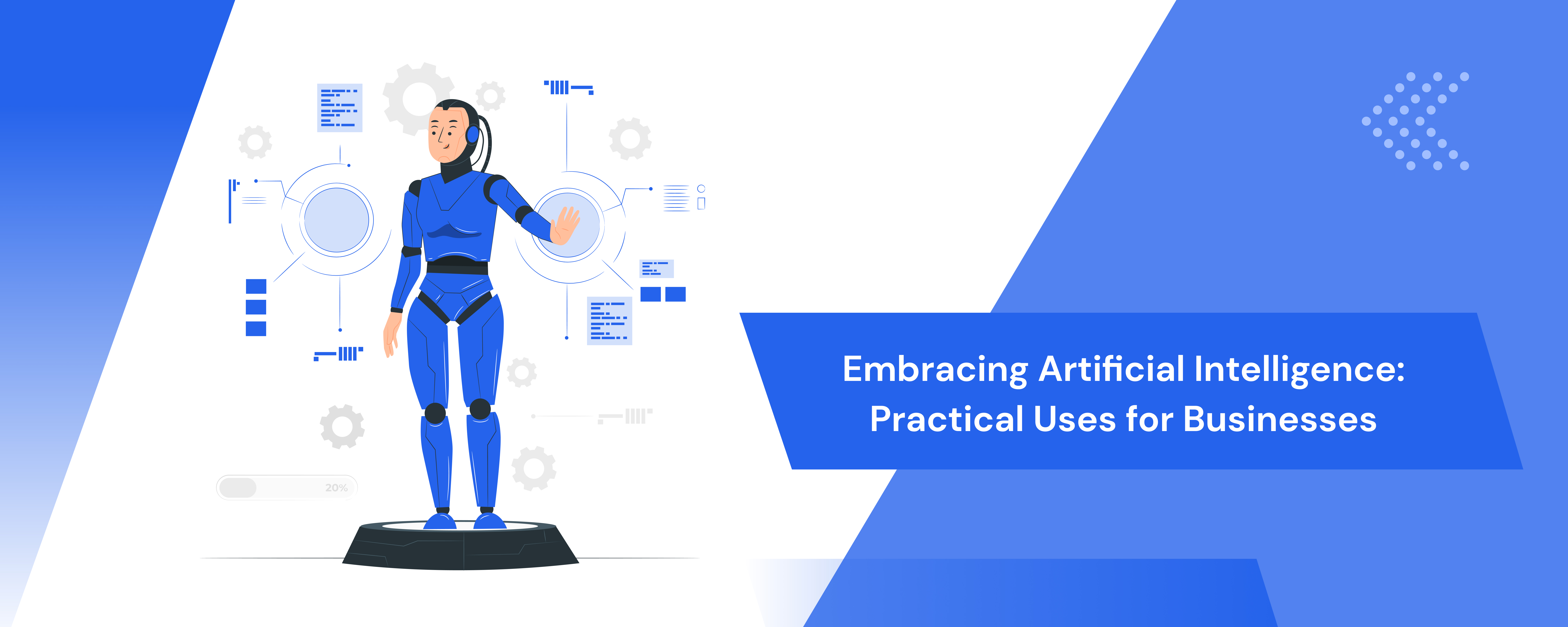Whether you are a business owner or marketing professional, it is time to embrace artificial Intelligence. Some practical uses of AI for businesses include automation and efficiency, data analytics, personalization, cybersecurity, employment engagement, and recruitment automation. In this article, let us discuss using Artificial Intelligence to gain a competitive edge in the market.
Table of Contents
Why should you integrate Artificial Intelligence into your business?
The Power Of Automation And Efficiency
Before we delve into the practical uses of AI for your business, let’s talk about the power of automation and efficiency. Thanks to AI, you can free your employees from boring and repetitive tasks and let them spend their energy on creative work. For example, Robotic Process Automation (RPA) uses bots to do mundane tasks. These bots ensure speed as well as accuracy. If you’re wondering what is Robotic Process Automation, it refers to the use of software bots to handle repetitive, rule-based tasks with greater efficiency and precision.
Personalization
AI can also help you personalize your business. Whether you are an e-commerce platform or run a streaming service, personalization enables you to improve your customers’ user experience.
By enrolling in an AI course, you can learn how to harness AI technologies effectively to create tailored experiences that boost customer satisfaction and drive engagement. This is a key component of successful AI integration for business.
Content Generation
AI can generate marketing copy, product descriptions, and even creative content such as music and stories, helping businesses stand out in a crowded marketplace. You can also use plugins such as WooCommerce Product Video to generate product showcases.
Data Analytics
Besides automating tedious tasks, Artificial Intelligence can help you with predictive analytics. Predictive analytics allows businesses to anticipate future trends and make informed decisions.
Improving Cybersecurity Measures
Artificial Intelligence can also help you improve your business’s cybersecurity measures. For example, you can use technologies such as anomaly detection. This technique can help AI algorithms identify unusual patterns in network traffic. This can help in early threat detection, preventing potential breaches.
Cybersecurity enhancement is another crucial aspect where AI makes an impact. Businesses looking to fortify their security posture can leverage cybersecurity AI tools—such as those discussed in the academy section—to address sophisticated threats and attacks. These innovative security solutions could significantly save resources by preemptively identifying vulnerabilities and neutralizing them before they escalate.
Enhanced Customer Experiences
Besides helping with your security, AI can also help you enhance customer experiences. For example, you can use virtual Assistants and chatbots. AI-powered chatbots can provide 24/7 customer support, answer questions, and resolve issues, improving customer satisfaction and reducing operating costs. You can also gain valuable insights into customer feedback and brand perception through AI analysis of social media, reviews, and surveys.
Innovation and Product Development
AI can also help you with innovation. You can optimize your product design according to market trends. You can also comprehensively analyze customer behavior and identify new product opportunities. This will help you improve customer experience as well.
Competitive Advantage
Another benefit of integrating AI into your business is an increase in ROI. You can achieve significant cost savings through efficiency gains. With AI implementation, you can also improve customer retention and acquisition. The result is going to be an enhanced brand reputation. This will help you stand out from your competition.
How Can You Embrace AI In Your Business?
Now that you understand the importance of AI in your business, let’s talk about some practical tips on practicing artificial Intelligence, detailing each step.
Assess your Business Needs and Objectives
The first step is to identify your business needs. These may include the pain points or issues you need to improve using AI. For example, you could use AI to optimize processes or enhance user experience. Whatever it is, AI is a solution for you.
Educate your Team
The next step is to educate your team members. For this, you should arrange workshops to upskill your employees.
Start with Small-Scale Implementation
It’s always a good idea to start small, even when you aim big. The best way to start your AI journey is with a pilot project. This allows you to work your way up and experiment as you go slowly. It will also help you build your confidence with AI.
Choosing the Right AI Strategies
The next step is to choose the right AI solutions. You should use robotic process automation (RPA) or predictive analytics for your organization’s challenges and pain points.
Data Strategy
It would help if you also focused on developing an effective data strategy. When you input quality data, you get quality results as well. Remember, AI works on the principle of garbage in and garbage out.
Hire AI Consultants
You should also collaborate with AI experts to further upskill your team. The AI experts can guide you through the implementation process and ensure you get caught up.
Focus on User Experience
One quick tip you must remember is that the ultimate goal of integrating AI into your business is the users. User experience is what matters the most. So, go for user-friendly interfaces to ensure smooth integration and adoption across all levels of your organization.
Measure the KPIs
Once you have gone through the abovementioned steps, the next stop is measuring the Key Performance Indicators (KPIs). Regularly evaluate the impact of AI on your business objectives and be prepared to iterate and refine your strategies based on the insights gained.
Focus on Human-AI Collaboration
One final tip that you need to keep in mind is human-AI collaboration. Contrary to the traditional idea, AI is about something other than replacing humans. Instead, it is about helping humans. By applying AI to your business using this perspective, you will be able to implement AI solutions much better.
Challenges of Integrating AI in Your Business
Next, discuss some issues you might face while implementing artificial Intelligence in your businesses. We will also discuss what solutions you can use to address the challenges.
Data Quality and Availability
AI relies on data quality. As discussed earlier, one of the significant impediments to implementing artificial intelligence solutions in your business is the need for more data quality. For this, you can implement the assessment and data governance practices.
Cost and Budget Restraints
You can go for an all-in-one software suite like GoZen if you want to reduce implementation costs. GoZen helped many customers achieve thousands of pounds/ dollars in sales with its AI-powered platform.
Talent and Skill Gaps
Apart from data quality issues, you also face talent and skill gaps. You can invest in training programs to bridge the talent gap.
Ethical and Regulatory Concerns
To address the ethical concerns, you can use an ethical AI framework. This will help you address biases and ensure fair use of AI.
Resistance to Change
You will also need to work on your employees’ resistance to change. For this, change management strategies can help you. You can also highlight the benefits of AI on business success.
Lack of Clear Objectives
Another issue businesses face is that they need to set clear goals for AI implementation. A good solution for this is to implement AI on small-scale pilot projects first.
Summary of Benefits of Embracing Artificial Intelligence
AI is transforming various industries, from improving operational efficiency in manufacturing to revolutionizing customer service in telecommunications. To implement such powerful changes and maintain a competitive advantage, businesses are now opting for professional AI consulting solutions. These solutions are pivotal in strategizing the integration of AI technologies aligned with business objectives, ensuring that the deployment is effective and brings about tangible results across different sectors. In some cases, companies turn to top software development companies in Europe for specialized expertise.
Conclusion
Integrating AI into your business is a project that takes time to develop. Instead, it is an ongoing journey. It would help if you had a future ready for dating. This will allow your organization to adapt to evolving AI technologies and remain at the forefront of innovation in your industry.



